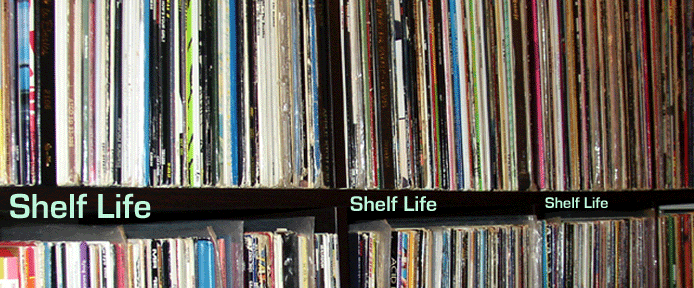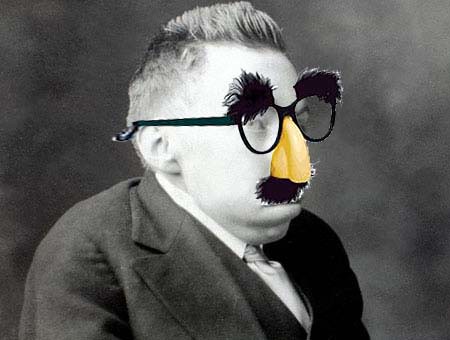The standard Young story generally holds that he went really nuts in the 80s, releasing a string of unlistenable genre experiments. This reputation is based almost entirely on Trans. Yes, he followed it up with a rockabilly album and a country album, but those are simply retro role-playing. Trans stands alone in Young's entire catalogue as the one time he attempted to make music from the future, not the past. While generally content to simply sound like himself, the album represents his first attempt to create a new sound since his work with Jack Nitzsche in the late 60s. Trans, believe it or not, is Young's Kid A.
The album, if you've never heard it, is Young's attempt to adopt electronic sounds. Many of the songs feature programmed drums and synthesizers. The lyrics are about technology, computers, robots. Young feeds his voice through a vocoder, at times tweaking it to such extremes that his voice is rendered incomprehensible, the sounds barely even recognizable as words.
Young makes the album's themes explicit right in the artwork. The front cover depicts two cars passing on a road that stretches into the horizon. On the right a 50s-era Cadillac with big ol' tailfins passes a hitchhiking Neil, shabby clothes on his back and a pair of bongo drums at his feet. On the right a futuristic car opens its gull-wing door to pick up what looks like a robot or hologram hitchhiking the other way. Behind Young grow grass and trees; behind the computerised guy rises a futuristic fantasy cityscape. The image on the back (sorry, couldn't find one online) is even more explicit: a human heart, with some of the vessels and chambers opened up to reveal wires and circuitry.
I actually only picked this one up recently, and was pleasantly surprised at how good it is. I'd always heard that the album was little more than an amusing curiosity, but it's actually very listenable. Not quite a triumph, but a solid effort. Whether or not one actually likes the overall robo-Neil sound of it, the album is at the very least an admirable experiment. Plenty of artists from Young's generation were trying to "update" their sounds in the early 80s by slathering a lot of cheesy synths and gated snares over the same tired songs, mostly in a transparently desperate attempt to stay relevant and keep selling records. Young, on the other hand, immersed himself in new music-making technology and wrote songs contemplating it. Trans is a lot of things, but it's certainly not blandly commercial.
Now for the bad. As is his occasionally frustrating wont, Young filled out the the record with older songs he'd had kicking around for a while. While this practice made albums like American Stars 'N Bars and Hawks & Doves sound inconsistent and somewhat watered down, on Trans it's a complete disaster. The opening track(!) is a nifty uptempo country-rock number complete with bongos and slide guitar called "A Little Thing Called Love". It's a cute little toe-tapper, but has no place on this album. Young opens side two with a similarly incongruous song and closes with a lengthy jam that sounds like Santana.
In a way one could argue that these songs function in juxtaposition to the others, highlighting the contrast between old and new, yesterday and today, analogue and digital. Even the lyrics are innocuous and sentimental. But they don't work that way. They just don't work, period, and keep Trans from being the flawed masterpiece it could have been.
Where the contrast really works is within the songs themselves: the way the electric rhythm guitar in the intro to "Sample and Hold" sounds so imperfect and human next to the artificial synth sounds. The vocal in "Transformer Man" is processed beyond recognition, and yet sings the album's most touching and tender melody. Young even recreates one of his earliest songs, Buffalo Springfield's "Mr. Soul", a song about the difficulty of maintaining artistic integrity in the face of commerce. Here he renders it stiff and mechanical, adding yet another layer of irony to the title.
Young has said that many of the songs were inspired by his efforts to communicate with his son, whose severe cerebral palsy limits his speech to such a degree that he needs computers and machines to express himself. Many of the lyrics detail a struggle to maintain control and remain human in a world of machines: "I feel like more than just a number," he sings in "Computer Age". Elsewhere, "You're a transformer man/Power in your hand".
As far as posting tracks here goes, starting with this album we are within the the range of a new compilation. In 1993 Geffen released Lucky Thirteen, a retrospective of the Geffen years compiled by Young himself. The album begins with the excellent "Sample and Hold" and "Transformer Man", so those are out. "Computer Age" is neatly representative of the album as a whole: strong melody, solid guitar playing that fits in nicely with the song's electro elements, and heavy vocoder abuse. Also, when Young recorded his MTV Unplugged set in 1995, he reversed what he'd done to "Mr. Soul" and turned an electronic song into an acoustic one. The performance shows how well the songwriting shines through without the digital decorations. Note the two or three lunatics in the audience who applaud in recognition at the opening line while the rest of the crowd wonders what the hell song this is. Sonic Youth did the same thing to "Computer Age" on the tribute album The Bridge; interesting, although it doesn't hold up through the transition quite as well as "Transformer Man" does.
Buy it... on vinyl.
From my deck to you: Neil Young - "Computer Age"
Bonus (not from vinyl): Neil Young - "Transformer Man (live)" and Sonic Youth - "Computer Age"
NOTE: This thing is out of print AGAIN?!? Are you fucking kidding me? Come ON, Geffen! Let it go!


3 comments:
DEVO enters this picture
Good point although, oddly enough, Young's association with Akron's finest really begins about five years prior, so their sound was hardly novel to him at this point. Still, there's no denying their influence on Young's direction here.
Neil Young's Unplugged was recorded in 1993, not 1995.
Nice review of Trans.. it *IS* an interesting album, even if it is not one that you can play over and over or play frequently.
Post a Comment